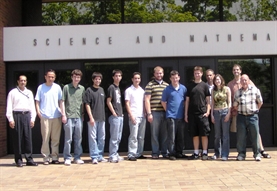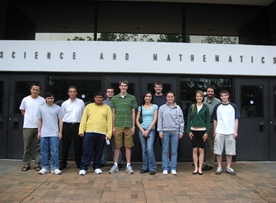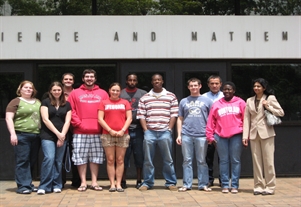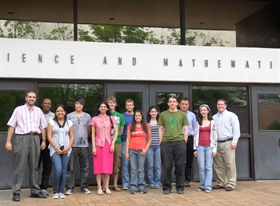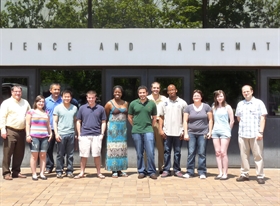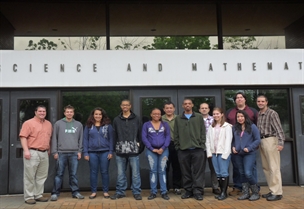Computational Science Laboratory


We are engaged in a diversity of projects focused on the intelligent use of sensors and data for support of decision making with applications to environmental management, agriculture, homeland security, etc. Our work spans over a diversity of fields including machine learning, pattern recognition, remote sensing, information assurance, high performance computing, image processing and computer vision. We are always open to further collaborations in these and other areas.
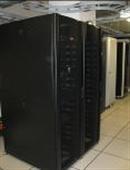
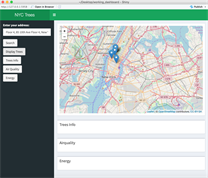
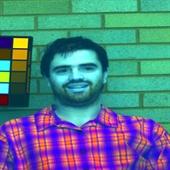
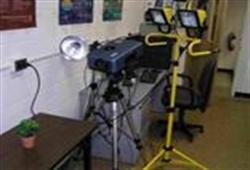
CURRENT
Spectral Imaging
We are working on a variety of problems centered on spectral imaging. First, we investigate a unifying framework for the use of higher order statistics in multispectral/hyperspectral image processing. The main goal is to find efficient algorithms for land cover classification, feature extraction and target detection. Second, we are also investigating new applications of spectral imagery. One direction followed here is the use of hyperspectral images for face recognition.
High Performance Computing based Applications
The project enhances computational science at Montclair State through research including collaborations with off campus partners as well as through student learning using high performance computing (HPC) environment as the infrastructure for this goal. This project covers areas in computational science, including: 1. Development and testing of novel approaches for spectral image processing; 2. Realistic simulation of magnetic fluid flows to model magnetic drug targeting and other biomedical applications; 3. Functional genomics analysis of DNA sequence data; 4. Computational identification of ligands bind to proteins; 5. Simulation of chemical reaction pathways important in the chemistry of air pollution; 6. Development of simulated censorship systems as a test bed for censorship circumvention; 7. Automatic machine recognition of idiomatic and deceptive language; 8. Inference of subsurface ocean waves from seismic data; 9. Modeling and simulation shoreline evolution; and 10. Modeling, simulation and control of stochastic dynamics.CSL's work focuses on projects connected to big data processing and visualization as well as distributed hyperspectral imaging. The HPC environment is funded through two NSF awards (CNS 1625636 and CNS 0922644).
Big Data Processing and Visualization for Social Good
The increased availability of data sources, coupled with improved processing techniques, and speedups in computing platforms have lowered the barrier for many scientists to build accurate powerful visualization and processing tools on a variety of topics. Our lab focuses on problems that have significant impact on the communities in the region where MSU located. This includes evaluation of transportation options by analyzing taxi and livery data, analysis of impact on housing of various aspects (vacation rentals, tree covers, etc.) or investigation of health emergencies (COVID-19), etc.
Spectral Imaging
We are working on a variety of problems centered on spectral imaging. First, we investigate a unifying framework for the use of higher order statistics in multispectral/hyperspectral image processing. The main goal is to find efficient algorithms for land cover classification, feature extraction and target detection. Second, we are also investigating new applications of spectral imagery. One direction followed here is the use of hyperspectral images for face recognition.
High Performance Computing based Applications
The project enhances computational science at Montclair State through research including collaborations with off campus partners as well as through student learning using high performance computing (HPC) environment as the infrastructure for this goal. This project covers areas in computational science, including: 1. Development and testing of novel approaches for spectral image processing; 2. Realistic simulation of magnetic fluid flows to model magnetic drug targeting and other biomedical applications; 3. Functional genomics analysis of DNA sequence data; 4. Computational identification of ligands bind to proteins; 5. Simulation of chemical reaction pathways important in the chemistry of air pollution; 6. Development of simulated censorship systems as a test bed for censorship circumvention; 7. Automatic machine recognition of idiomatic and deceptive language; 8. Inference of subsurface ocean waves from seismic data; 9. Modeling and simulation shoreline evolution; and 10. Modeling, simulation and control of stochastic dynamics.CSL's work focuses on projects connected to big data processing and visualization as well as distributed hyperspectral imaging. The HPC environment is funded through two NSF awards (CNS 1625636 and CNS 0922644).
Big Data Processing and Visualization for Social Good
The increased availability of data sources, coupled with improved processing techniques, and speedups in computing platforms have lowered the barrier for many scientists to build accurate powerful visualization and processing tools on a variety of topics. Our lab focuses on problems that have significant impact on the communities in the region where MSU located. This includes evaluation of transportation options by analyzing taxi and livery data, analysis of impact on housing of various aspects (vacation rentals, tree covers, etc.) or investigation of health emergencies (COVID-19), etc.
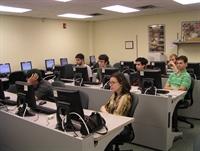


COMPLETED
iMagine REU
Each summer between 2007 and 2012 we organized a 8 week intensive undergraduate research program where students worked individually and collaboratively on a wide variety of imaging and computer vision problems benefiting from a group of experienced research mentors.
This project was last funded under the NSF Research Experience for Undergraduates / DoD Awards to Stimulate Undergraduate Research Experiences (Assure). Award # IIS-1004447. Between 2007 and 2010, the program was funded under the NSF Research Experience for Undergraduates / DoD Awards to Stimulate Undergraduate Research Experiences (Assure). Award # IIS-0648814
Greening the Data Centers
The goal of this research was to develop a decision support system (DSS) for green computing in data centers. DSS are used throughout the world today in various fields such as medicine, management, routing airplanes, and wherever complex organization is needed. DSS is basically a computer based application to assist in providing solutions to multifaceted problems. In the case of green computing a DSS was developed for the design and retrofitting of data centers using decision trees and case based reasoning. This project was funded under the PSE&G (Public Service Enterprise Group) Technology Demonstration Grant Program.
Roboto-San
Montclair State University (MSU) organized a series of free public activities from October to December 2017 that explored differing perspectives on artificial intelligence (AI) and robotics in Japanese and Western cultures. The program also addressed related themes, including the philosophical questions posed by robotics, the history of “intelligent machines”, and New Jersey’s role in the development of artificial intelligence. The project was funded by the New Jersey Council for Humanities and the MSU's Global Education funds.
iMagine REU
Each summer between 2007 and 2012 we organized a 8 week intensive undergraduate research program where students worked individually and collaboratively on a wide variety of imaging and computer vision problems benefiting from a group of experienced research mentors.
This project was last funded under the NSF Research Experience for Undergraduates / DoD Awards to Stimulate Undergraduate Research Experiences (Assure). Award # IIS-1004447. Between 2007 and 2010, the program was funded under the NSF Research Experience for Undergraduates / DoD Awards to Stimulate Undergraduate Research Experiences (Assure). Award # IIS-0648814
Greening the Data Centers
The goal of this research was to develop a decision support system (DSS) for green computing in data centers. DSS are used throughout the world today in various fields such as medicine, management, routing airplanes, and wherever complex organization is needed. DSS is basically a computer based application to assist in providing solutions to multifaceted problems. In the case of green computing a DSS was developed for the design and retrofitting of data centers using decision trees and case based reasoning. This project was funded under the PSE&G (Public Service Enterprise Group) Technology Demonstration Grant Program.
Roboto-San
Montclair State University (MSU) organized a series of free public activities from October to December 2017 that explored differing perspectives on artificial intelligence (AI) and robotics in Japanese and Western cultures. The program also addressed related themes, including the philosophical questions posed by robotics, the history of “intelligent machines”, and New Jersey’s role in the development of artificial intelligence. The project was funded by the New Jersey Council for Humanities and the MSU's Global Education funds.
